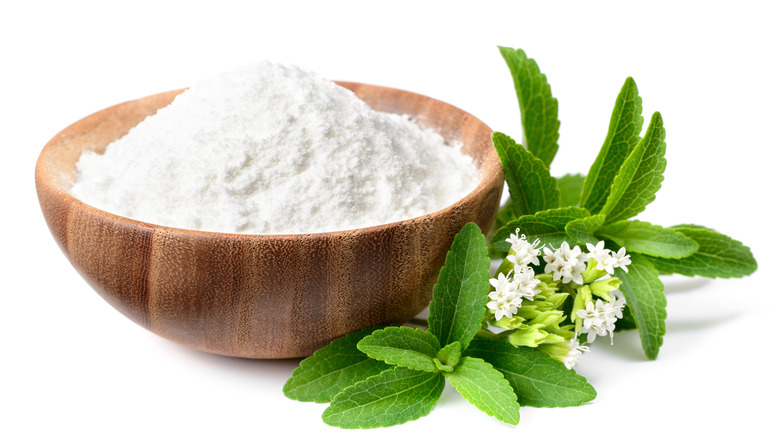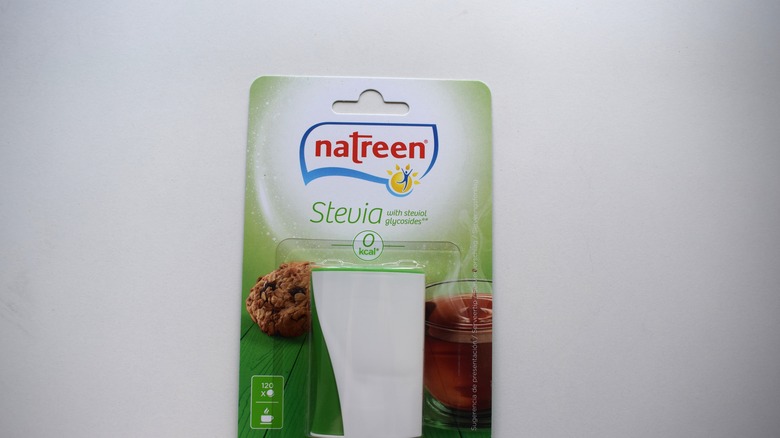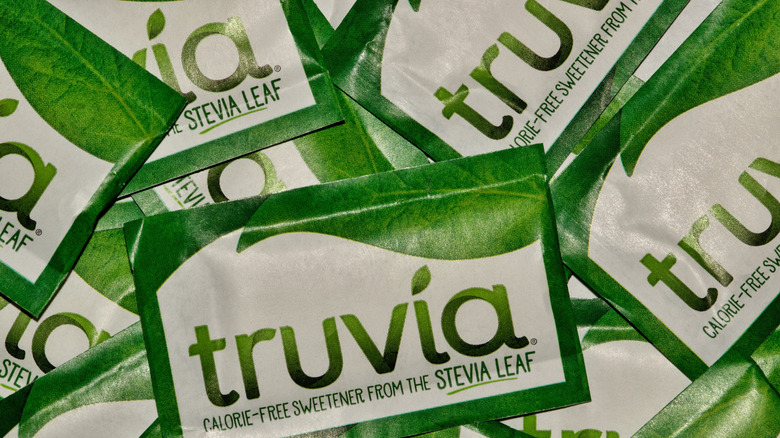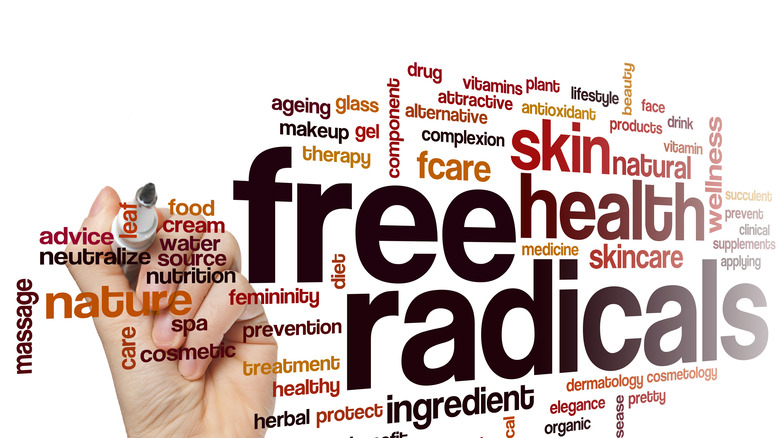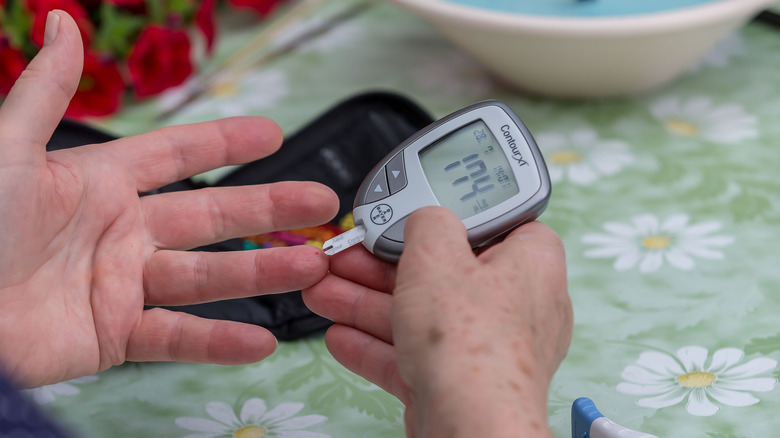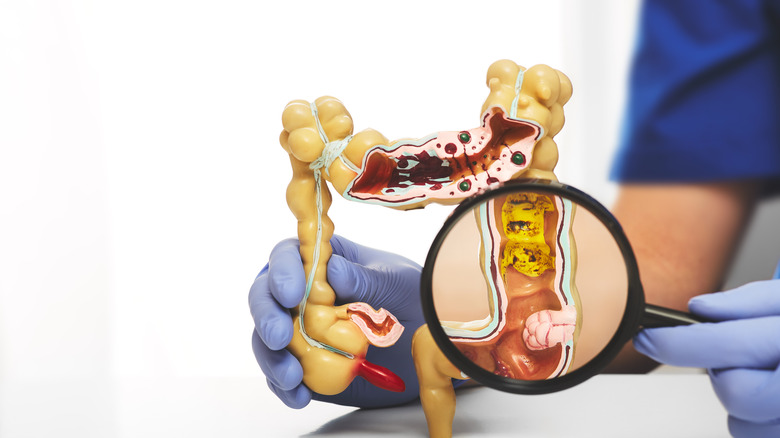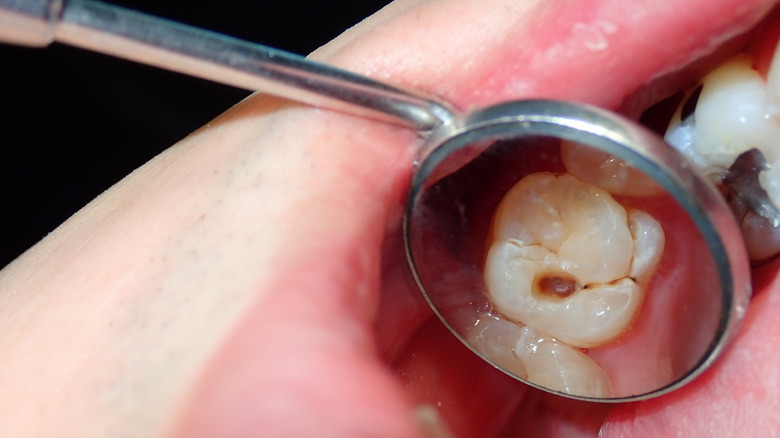The Complete Guide To Stevia And Your Health
Stevia is a zero-calorie sweetener derived from Stevia rebaudiana – a plant from the sunflower family indigenous to South America where it was first consumed, notes a 2015 article published in the journal Nutrition Today.
Known as "sweet herb," the dried leaves of the stevia plant were used by the natives to sweeten teas and medicines for more than 200 years. While the term "stevia" generically refers to the various forms of the sweetener (e.g., whole plant, plant extracts), in this discussion it will pertain to the high-purity stevia leaf extract that is officially approved for use in foods and beverages. This highly purified stevia extract contains a 95% or greater concentration of steviol glycosides — the sweet components of the stevia leaf that can be up to 300 times sweeter than table sugar. Once ingested, stevia does not accumulate in the body and passes through unmetabolized, generating zero calories. Based on evidence from more than 200 studies supporting its safety, stevia has been given GRAS (Generally Recognized as Safe) status by the FDA.
As a sugar substitute with negligible calories (so low it can be classified as "zero-calorie"), stevia can benefit people trying to lose weight or lower blood pressure (via Medical News Today). By minimally affecting blood glucose and insulin levels, stevia may be helpful for people with diabetes as well. According to a 2021 review of studies published in the EXCLI Journal, stevia also has potent antioxidant, antibacterial, and anti-inflammatory properties. Thus, stevia products may be useful in the prevention or treatment of cancer, kidney disease, dental caries, and autoimmune diseases such as rheumatoid arthritis and lupus.
Bioactive compounds in stevia
The components of the stevia plant responsible for its sweet taste are called steviol glycosides, reports the Calorie Control Council. Steviol glycosides are the actual compounds extracted from stevia leaves that are used as a tabletop sweetener as well as to provide sweetness to various foods and beverages. Among the known steviol glycosides, rebaudioside A and stevioside are the most prominent and widely used sweeteners (via a 2017 article published in the journal Current Pharmaceutical Design).
Rebaudioside A is the sweetest stevia extract, registering at 250-400 times sweeter than table sugar. Stevioside comes in second at 250-300 times sweeter than sugar. Steviol glycosides have been shown to possess health-promoting properties that may have therapeutic potential in the treatment of a variety of diseases and conditions including cancer, diabetes, high blood pressure, cystic fibrosis, obesity, and dental caries.
According to a 2021 review of studies published in journal Applied Microbiology and Biotechnology, other components of the stevia plant may confer health benefits as well. These additional bioactive compounds include phenylpropanoids, flavonoid glycosides, phenolic acids, coumarins, and some essential oil.
History of stevia around the world
Stevia as a sweetener that dates back to the Guarani Indians indigenous to South America, primarily Paraguay (via a 2021 review of studies published in the EXCLI Journal). The natives used the leaves of the stevia plant as a sweetener to offset the bitter taste of mate tea. In the late 19th century, the botanist Moises Santiago Bertoni "rediscovered" stevia and renamed it from Eupatorium rebaudianum to Stevia rebaudiana. Abundant production of stevia began on South American plantations in 1920. A decade later, the first glycoside responsible for the sweet taste of stevia was identified by French chemists, who named it stevioside. Rationing and shortages of sugar during World War II brought about the introduction of stevia in the U.K.
Relative to Europe and the United States, Japan has a long history (beginning in the 1970s) of using purified stevia extracts as sweeteners, but only after they were extensively tested for safety (via Science Direct). Among the large variety of food and beverage products sweetened with stevia in Japan are soft drinks, candies, chocolate, chewing gum, ice cream, yogurt, jam, pudding, and tabletop sweeteners. In 2013, the Coca-Cola company launched new versions of some drinks with stevia replacing sugar and claiming a 30% calorie reduction (via the 2021 review).
FDA approval of stevia
In 1991, "due to inadequate toxicological information," the U.S. Food and Drug Administration (FDA) banned the importation of all forms of stevia into the United States (via a 2018 study published in Food and Chemical Toxicology). In 1995, in accordance with the Dietary Supplement Health and Education Act of 1994, stevia was allowed to be imported and sold only as a dietary supplement or for use as an ingredient in a food supplement.
Finally, in 2008, after years of numerous petitions to approve stevia as a sweetener, the FDA granted GRAS (Generally Recognized as Safe) status without objection for the use of a highly purified steviol glycoside (rebaudioside A) as a general-purpose sweetener in foods. Since 2008, the number of stevia products available on the market has exceeded 10,000 (via Today's Dietitian).
The 1991 banning of stevia in the United States was controversial since the sweetener was already being consumed by people all over the world, reports the American Council on Exercise. Today, stevia is used to sweeten soft drinks, chewing gums, wines, yogurts, candies, and numerous other foods and beverages. Popular U.S. brands that contain stevia include SoBe Lifewater Zero, Gatorade's G2, VitaminWater Zero, Crystal Light, and Sprite Green. An Acceptable Daily Intake (ADI) for the highly purified stevia extract has been established at roughly 12 milligrams per kilogram body weight per day, notes Todays' Dietitian. For a 150-pound person, this amount translates to the daily ingestion of 40 packets of tabletop stevia sweetener.
Use of stevia as a sugar substitute
Like sugar, stevia is added to numerous processed foods and can be used as a tabletop sweetener in powder or liquid forms, explains a 2017 edition of Today's Dietitian. Some popular brands of tabletop stevia include Truvia, PureVia, Splenda Naturals, Stevia in the Raw, and SweetLeaf. Due to the bitter aftertaste of stevia, many of these tabletop products are actually blends of stevia and other sweeteners (e.g., aspartame, erythritol, or sucrose). For example, Coca-Cola Life and Pepsi True are blends of stevia and sugar with 30-35% fewer calories. The bitter taste of stevia relative to other sweeteners can be masked and made more acceptable by using it in beverages that are ice cold, acidic (e.g., lemonade), or contain fat, such as a latte. In fact, researchers are investigating ways to breed a sweeter stevia plant.
Since stevia is resistant to heat, it is not contraindicated for baking or use in hot beverages or foods, continues Today's Dietitian. When following a recipe, the sweetness equivalent of 1 cup of sugar is 1/4 cup or less of powdered stevia. However, since stevia lacks some of the physical qualities of sugar, it's use in baked goods may result in undesirable texture (via WebMD). Some suggestions to compensate for this include incorporating whipped egg whites if you're making cake batter or adding more baking soda or powder to quick bread dough.
Antioxidant and anti-inflammatory actions of stevia
Oxidative stress occurs when the production of destructive free radicals exceeds the capacity of the body's antioxidant defense to destroy them, resulting in tissue damage and inflammation (via EXCLI Journal). Oxidative stress is implicated in many age-related diseases such as cancer, diabetes, obesity, and neurodegenerative diseases. The leaves of the stevia plant contain compounds that have been shown to directly defuse reactive free radicals as well as bond with certain minerals, preventing their ability to promote the generation of free radicals.
In a cell culture study, heart cells from rats pretreated with stevia glycosides survived longer than a control cell group after being exposed to hydrogen peroxide — a source of highly reactive free radicals. This was likely due to the increased levels of antioxidants and antioxidant enzymes in the cells treated with stevia compounds. In an animal study, one of the main sweet components of stevia, stevioside, was shown to markedly decrease oxidative stress in the liver and kidneys of diabetic rats.
As reported in a review of studies published in a 2020 edition of the journal All Life, compounds in stevia leaves also have the ability to reduce inflammation –another major contributor to numerous chronic diseases. Mounting evidence supports the potential use of stevioside as a non-toxic agent to fight inflammation. Animal and cell culture studies have shown that the anti-inflammatory activity of stevioside is mostly due its ability to block the secretion by immune cells of pro-inflammatory cytokines such as TNF-alpha (tumor necrosis factor-alpha) and IL-6 (interleukin-6).
Stevia and weight control
Based on evidence from some randomized controlled trials, modest weight loss can be achieved by consuming foods and drinks sweetened with zero-calorie sweeteners in lieu of their normal-calorie counterparts (per Today's Dietitian). Using stevia to replace caloric sweeteners is likely to result in a similar outcome. Data from clinical trials support the use of stevia for weight management and moderation of calorie intake. In a 2020 randomized, controlled trial in healthy adults published in the journal Nutrients, participants who ingested stevia drops on a daily basis for 12 weeks maintained their weight while those in the control group experienced a significant weight gain.
Additionally, people in the stevia group significantly slashed their calorie intake over the 12-week period while the controls did not. A 2017 review of studies published in the Journal of Medicinal Food concluded that stevia may potentially be used as a natural and alternative treatment for the various conditions that contribute to metabolic syndrome, including abdominal obesity.
One of the studies determined that replacing sugar with stevia and other zero calorie sweeteners for 9 to 10 days was associated with a weight loss of one pound from burning 380 calories/day. Moreover, several animal studies showed that consumption of steviol glycosides favored reduction of body weight.
Stevia and blood sugar and insulin levels
Since stevia sweeteners are essentially free of any calories or carbohydrates, it's not unexpected that they do not increase blood levels of glucose or insulin (via Medical News Today). Accordingly, people with diabetes who need to control blood sugar and insulin levels can use stevia to sweeten foods and beverages without consuming additional carbohydrates. In a study published in a 2010 edition of the journal Appetite, healthy adults consumed a light snack sweetened with either stevia, sucrose, or aspartame 20 minutes before eating breakfast, lunch, and dinner. After-meal glucose and insulin levels were significantly lower in the participants who consumed stevia snacks compared to those who ingested sucrose snacks.
Interestingly, stevia snacks caused lower after meal insulin levels to a greater extent than aspartame snacks, even though both sweeteners are calorie-free. This finding suggests that the consumption of fewer calories cannot be the only mechanism to account for stevia's positive effects on blood glucose and insulin levels.
A 2022 systematic review and meta-analysis published in the journal Food Science & Nutrition suggests that stevia leaf and its active components may be a safe and promising treatment for diabetes. Though animal research made up the bulk of the studies, one study in patients with noninsulin-dependent diabetes showed that stevia significantly lowered glucose levels. The antidiabetic effects of stevia are due in part to increasing insulin sensitivity and reversing insulin resistance. Stevia helps maintain blood glucose levels by suppressing glucagon (the hormone that raises low blood glucose) and gluconeogenesis (synthesis of new glucose in the liver) as well.
Stevia and blood pressure
Stevia may benefit people with high blood pressure. Some of the sweet glycoside components of stevia leaves are known to cause vasodilation (widening of blood vessels) as well as diuresis (increased urination) and natriuresis (increased excretion of sodium in the urine) — all effects associated with reduction of blood pressure (via Medical News Today).
While some clinical trials produced negative results, others support the potential use of stevia in the treatment of high blood pressure (per Science Direct). In a 12-month double-blind, randomized, placebo-controlled trial, treatment of adults with hypertension with stevioside (a major glycoside) caused a significant drop in blood pressure after three months and lasted for the duration of the study.
Stevioside was tolerated well with no adverse reactions. A similar decrease in blood pressure was observed by the same research group in a longer two-year study in which participants treated with stevioside experienced less left ventricular hypertrophy — thickening of the walls of the heart's main pumping chamber — compared with controls.
Stevia and cancer
According to 2020 review of studies published in All Life, inflammation is a hallmark of cancer formation and development while a high intake of antioxidants can lower cancer risk. The ability of stevia to act as both an antioxidant and an anti-inflammatory agent plays a prominent role in its anti-cancer activity. Cell culture studies have shown that the glycoside found in stevia leaves known as stevioside can induce death in various human cancer cells including those of the breast, leukemia, lung, and stomach (via Healthline).
Interestingly, while stevia functions as an antioxidant to destroy free radicals in normal tissue, it also conversely generates free radicals as lethal weapons within cancer cells which damage cell components (e.g., DNA, protein), leading to cell death. In a 2018 study published in the journal Oncotarget, steviol — "a colonic metabolite of natural sweetener and also a component in leaves of stevia" – was shown to "intensively" inhibit the proliferation of six types of human cancer cells of the gastrointestinal tract. This anti-cancer impact of stevia was as effective as the chemotherapy drug 5-fluorouracil (5-FU). Based on these finding, it was suggested that steviol may potentially be used as a chemotherapy agent for cancer treatment.
Stevia and dental caries
Stevia does not promote dental caries because it does not contain fermentable carbohydrates that can be metabolized by mouth bacteria into acids that damage tooth enamel (via a 2017 study published in the British Dental Journal). Compared with rinsing with sucrose, rinsing with stevia has been shown to result in significantly less acid production. Beyond being a tooth-friendly sweetener, stevia possesses antibacterial, anti-plaque, anti-gingivitis properties that may be helpful in the prevention and treatment of dental caries as well (via the EXCLI Journal).
Key factors in the development of tooth decay include poor oral hygiene and consumption of carbohydrate-rich foods that promote the proliferation of oral bacteria. Laboratory experiments have shown that the growth of bacteria that cause dental caries – Streptococcus mutans, S. sobrinus, and Lactobacillus acidophilus — is halted by stevia. When compared with sucrose, a solution of stevia extract reduced the number of bacteria in the mouth.
Risks versus benefits of stevia
As a sweetener without calories or carbohydrates, stevia can help people lose weight while providing a variety of other health benefits as well (via Healthline). For example, studies have shown that stevia can improve metabolic health by helping regulate blood sugar and insulin levels, lowering levels of total cholesterol, LDL ("bad") cholesterol, and triglycerides, while also raising levels of HDL ("good") cholesterol. With regard to risks, the glycosides (e.g., rebaudioside A) used in stevia sweeteners are "Generally Recognized as Safe" (GRAS) just as coffee, tea, fruit, etc. are also GRAS. Thus, stevia products are safe to use in reasonable amounts, though the slightly bitter taste may not suit everyone. However, whole-leaf stevia or "crude stevia extract" have not been approved due to insufficient toxicological data. Unprocessed raw stevia may have negative effects on the kidneys, reproductive system, and cardiovascular system. It may also interfere with anti-diabetic drugs.
People with diabetes who track their carbs should be aware that some stevia products also contain different forms of sugar (e.g., dextrose, maltodextrin) as well as sugar alcohols (e.g., erythritol, sorbitol) that can impact total carb intake, according to Healthline. Some sugar alcohols can cause gut issues such as bloating and gas in some people. A recent report suggests that stevia and other nonnutritive sweeteners may negatively affect the gut microbiota; further research on this topic is warranted (via a 2019 study published in the journal Nutrients).

